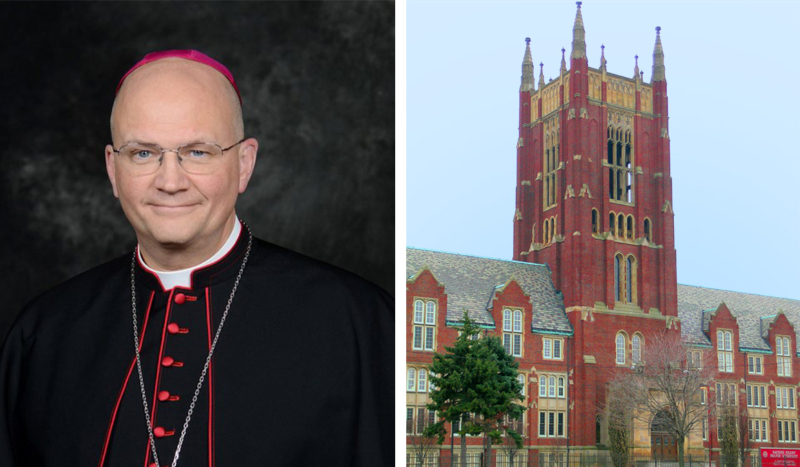
Archbishop Edward Weisenburger by Archdiocese of Detroit (Left), Sacred Heart Major Seminary by Andrew Jameson / Wikimedia Commons (Right)
Ed Peters, a prominent US canon lawyer, was dismissed from his position as professor and Edmund Cardinal Szoka Chair of Faculty Development at Sacred Heart Seminary last week, marking the third such unexplained firing by Archbishop Edward Weisenburger.
“My Sacred Heart Major Seminary teaching contract was terminated by Abp. Weisenburger this week,” Peters announced via a post on X. “I have retained counsel. Except to offer my prayers for those affected by this news and to ask for theirs in return, I have no further comment at this time.”
Perhaps best known for founding and running the website Canonlaw.info, Peters was also the first layman to have been given a role at the modern Apostolic Signatura, the Church’s highest judicial body, according to his Sacred Heart profile, which has been scrubbed from the seminary’s website but can still be viewed in archival form.
Peters, who has taught at Sacred Heart Seminary since 2005, is one of three longtime professors who were relieved of duties last week. Eduardo Echeverria, professor of philosophy and systematic theology, and Ralph Martin, professor of theology and director of graduate programs in the new evangelization, were both fired on July 23, as CatholicVote previously reported.
A number of well-known figures have offered their condolences and prayers for Peters, as well as voicing concern over the archbishop’s actions.
“If you were a young man in the Archdiocese of Detroit considering the priesthood, why would you go to a seminary that fired three of its most distinguished faculty members over having been faithful to the Magisterium?” New York Times bestselling author Rod Dreher asked via X.
Archbishop Weisenburger, who was appointed to his current role in February, has already generated significant controversy in his short time as the leader of nearly one million Catholics in his archdiocese. Archbishop Weisenburger, who is widely perceived as both theologically and politically progressive, has been criticized for his seeming persecution of those who hold to more traditional positions. Critics perceive many of his actions as targeting those who are attached to the Latin Mass, publicly hold to Catholic orthodoxy, or have been critical of Pope Francis’ pontificate.
>> Detroit archbishop limits Latin Mass to 4 non-parish sites <<
Some, such as Catholic philosopher Edward Feser, have contrasted the archbishop’s actions with the guidance given by Pope Francis himself to bishops about the importance of being a “listening Church” and respecting the important role the laity plays in the Church.
“Pope Francis is calling us to be a truly listening church,” Archbishop Weisenburger wrote in 2023 in an op-ed for America Magazine. “He invites all of the baptized, the entire Body of Christ, to engage in an ongoing process of discernment which he describes as the ‘synodal path.’”
He continued to define the term throughout his writing.
“It is perhaps helpful also to note what synodality is not,” he wrote. “It is not a political process in which there are winners and losers. We must not think of synodality as a power game whereby those with differing theological visions of the church and its mission contend for control and dominance.”
When contacted last week after initial reports of firings at the seminary, the archdiocese told CatholicVote it does not comment on personnel matters.
>> Cardinal Burke asks Pope Leo to act on behalf of Traditional Latin Mass faithful <<

